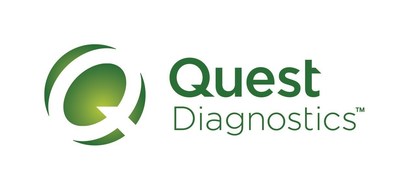SECAUCUS, N.J., Sept. 7, 2017 /PRNewswire/ -- Quest Diagnostics (NYSE: DGX), the world's leading provider of diagnostic information services, today announced that all of the company's cholesterol test services that involve estimates of low-density lipoprotein cholesterol (LDL-C) now use a novel calculation shown to improve the accuracy of testing for levels of LDL-C, a key marker of risk of cardiovascular disease.

The method also has the advantage of not requiring the patient to fast from food for several hours prior to a blood draw, enhancing the patient experience.
Quest Diagnostics is the first national laboratory provider in the United States to enable accurate nonfasting lipid testing using the novel method in patient testing. The calculation, which is not affected by recent food intake, is based on an internationally recognized formula from cardiologist Seth Martin, M.D., assistant professor of Medicine at the Johns Hopkins University School of Medicine. It is designed to replace the Friedewald calculation, which has been the standard method used by laboratories for LDL-C analysis in cholesterol testing in the United States since 1972.
The development is the result of a license agreement between Quest Diagnostics and the Johns Hopkins University. Today, any patient tested with a Quest Diagnostics cholesterol test that includes LDL-C estimates, such as comprehensive cholesterol test panels, will receive results calculated using the new method. Pricing and insurance coverage is unaffected.
"This new approach from Quest Diagnostics, the largest national laboratory provider, means millions of patients will have broad access to a more accurate method of assessing their risk for, and aiding treatment of, cardiovascular disease, a leading cause of death and disability in the United States," said Eliot A. Brinton, M.D., FAHA, FNLA, president, Utah Lipid Center in Salt Lake City, member of the board of directors of the National Lipid Association, and past president of the American Board of Clinical Lipidology. "It replaces an outmoded approach to estimating levels of the bad cholesterol, LDL. Although that method has been the standard for 45 years, it is inaccurate and misleading in many cases, especially when the patient is not fasting. The old method is being replaced with a more precise view of a patient's LDL-C, which does not require an overnight fast."
"Our improved LDL cholesterol analysis reflects the Quest commitment to provide the broadest access to diagnostic innovation and actionable health insights, but it's also about providing a better consumer experience and greater convenience," said Jay Wohlgemuth, senior vice president, R&D, Medical, and chief medical officer, Quest Diagnostics. "Fasting for eight to 12 hours visiting a patient service center for a blood draw in the morning is challenging and may deter many patients from participating in lipid testing. Now, millions of people no longer have to go through this process to receive a reliable lipid test result through Quest Diagnostics."
Quest provides diagnostic services to one in three American adults each year, with broad national access for patients through its 2,200 patient service centers, including through its collaborations with Safeway and Walmart, and relationship with half of all physicians and hospitals. Cholesterol testing is among the top 10 most commonly ordered test services Quest provides each year, and is a critical component of strategies to prevent heart attack and stroke.
Nearly one of every three American adults has high levels of LDL-C, the so-called "bad" cholesterol. Blood levels of LDL-C, as determined by lab tests, can help physicians identify heightened risk of cardiovascular disease, including heart attack and stroke.
New method aids personalized treatment
LDL-C blood assessment can also aid treatment decisions. National and international guidelines generally refer to a target level of <70 mg/dL for high-risk patients to guide treatment decisions with statins or PCSK9 inhibitors. Yet, a study recently published in the Journal of Lipidology found that approximately one-fifth of individuals with Friedewald-estimated LDL cholesterol at levels below 70 mg/dL actually had a value of 70 mg/dL or higher using the new equation.
"Accordingly, ongoing use of Friedewald estimation may lead to the misclassification of high-risk individuals and subsequent under-utilization of lipid-lowering therapies," wrote the authors, which include Dr. Martin. Quest Diagnostics did not participate in the study.
Other research also shows that PCSK9 inhibitors, introduced in 2015, may reduce LDL-C to 25 mg/dL or lower -- levels which the Friedewald equation was never designed to calculate.
"With the advent of more aggressive statin use, PCSK9 inhibitors, and lower LDL-C goals, we've entered an era of driving LDL-C as low as possible for high-risk patients. It's exciting to have wide access to an LDL-C calculation which is accurate at very low levels," Dr. Brinton said.
"Precision medicine is changing how we treat disease, but it isn't possible without insights from diagnostic services," said Dr. Wohlgemuth. "By offering this new capability, we will help the medical community better assess and care for vulnerable patients in a more convenient way, potentially preventing adverse cardiovascular outcomes."
About Quest Diagnostics
Quest Diagnostics empowers people to take action to improve health outcomes. Derived from the world's largest database of clinical lab results, our diagnostic insights reveal new avenues to identify and treat disease, inspire healthy behaviors and improve health care management. Quest annually serves one in three adult Americans and half the physicians and hospitals in the United States, and our 43,000 employees understand that, in the right hands and with the right context, our diagnostic insights can inspire actions that transform lives. www.QuestDiagnostics.com.
50th Anniversary: In 2017, Quest Diagnostics celebrates 50 years of life-changing results. To learn about our legacy of accomplishments and quest to improve healthcare in the future, visit www.QuestDiagnostics.com/50Years
Quest, Quest Diagnostics, and all associated Quest Diagnostics registered or unregistered trademarks are the property of Quest Diagnostics. All third-party marks are the property of their respective owners.
SOURCE Quest Diagnostics